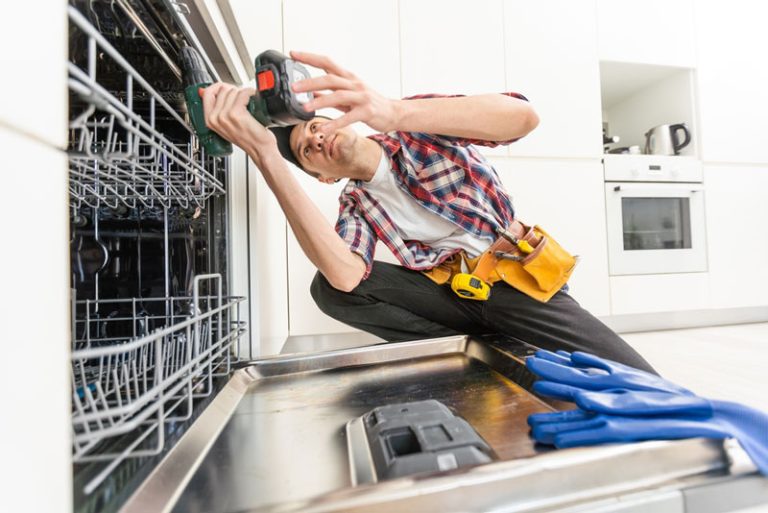Are you wondering to yourself, why is my dishwasher leaking? Dishwashers are designed to manage large loads of water without leaving puddles on your kitchen floor. They are extremely convenient time-saving appliances, but when they leak, it’s incredibly frustrating until you can find the cause.
What Causes a Leaky Dishwasher?
A variety of factors can cause dishwasher leaks, and it’s crucial to identify the root cause before the leak turns into a bigger and more expensive problem. Here are some of the most common reasons for dishwasher leaks and what to do about them.
Blocked Drainage
Your dishwater operates with a number of safety points in order to conserve water and prevent leaks. But if the dishwater can’t properly drain water, those safety points can’t stop water from spilling out onto your kitchen floor. Blocked drainage is one of the most common causes of dishwasher leaks.
The dishwasher is meant to drain from the tub. If that drain is blocked for any reason, the water can easily overflow and cause a leak. You might be surprised how little it takes to block the dishwasher drain hole. A stray lettuce leaf, a chunk of meat, and fat or grease buildup are often sufficient to cause a problem.
Homeowners often believe that rinsing dishes ahead of time helps with getting dishes sparkling clean. But it also serves a secondary purpose of helping to keep the tub drain hole clear.
If your dishwasher consistently leaves water on the kitchen floor after a cycle, check the drain with a flashlight for signs of debris that need to be cleared. If there is no debris, the cause could be a malfunctioning drain valve, in which case a plumber should be called.
Worn or Damaged Gasket
The dishwasher gasket is the thick, black rubber seal in place around the perimeter of the door. The gasket ensures a tight seal when you shut the door. Over time, the gasket can fall out of place. The rubber may also dry out and shrink or develop tiny little divots or pinholes. In any case, if the gasket is in disrepair or out of place, it can’t properly seal the door shut during a cycle, and a water leak will likely occur.
If the dishwasher leak you’re experiencing is around the door or the base of the dishwasher near the gasket line, there’s a good chance it’s gasket-related. There is a dedicated channel where the gasket fits in. Visually examine the gasket to see if it is in the proper place. If it’s out of place, you may be able to push it back into place with your fingers or with the help of a dull, flat butter knife.
Check to see that the gasket is clean. Food debris often builds up on dishwasher gaskets, preventing it from sealing the door properly. Clean it with a damp cloth to remove debris.
If the gasket is old or damaged, you can order a new one and install it yourself. If you have trouble fitting the new gasket around, your plumber can help.
Damaged Pump or Valve
As mentioned, your dishwasher has certain features that work to prevent leaks. With so much high-pressure water jetting around inside during a cycle, you can imagine how important it is that everything functions well. One of these functions is the pump and valve, which work together to move water in and out of the dishwasher.
If either of these is damaged or worn, the function fails. A clogged valve typically causes water to spill onto the kitchen floor. A damaged pump may cause water to accumulate inside the tub without draining out as it should. Both problems necessitate calling a qualified technician for diagnosis and repair.
Improper Loading
Every model of dishwasher has its own best loading style. Manufacturer’s instructions for loading should always be reviewed and followed, no matter how long you’ve been using dishwashers. It’s so important that loading or stacking dishes the wrong way can actually cause your dishwasher to leak.
Part of the problem stems from the direction the water is being sprayed. If you have dishes blocking a spray where it shouldn’t, the spray will be misdirected in a way that shoots water where it should go. The other part of the problem is that dishes loaded or stacked improperly can block the spinning action of the spray arm. Again, this can lead to leaks and improper draining.
When you have time, be sure to instruct all the members of your family on the proper way to load the dishwasher because it’s not only going to be you doing this chore (even though it may seem like it sometimes!).
Corroded Connections or Supply Lines
Sometimes the problem of a leaky dishwasher is more complicated, such as in the case of corroded connections or supply lines. Water supply lines are typically made of metal, which can corrode from well water or hard water. Corrosive elements in some water can eat away at the water lines, creating minuscule pinholes.
You should know that if you do have hard water or well water, and it’s corroding connections in your dishwasher, chances are the problem is more widespread. Your main plumbing system could be affected, too. This type of issue will not resolve itself and requires the services of a professional. If you suspect this problem, contact a technician right away for help before the problem gets worse.
Solve Your Problems Today!
No matter what the underlying cause of your dishwasher leaks, it’s crucial to act quickly. If it’s something like a worn or out-of-place gasket or something else you can fix yourself, be sure to act swiftly. Otherwise, consult with a qualified technician for diagnosis and repair. Water leaks from your dishwasher can eventually lead to costly structural damage to your home. Routine and proper maintenance will help to ensure years of reliable, lead-free service from your dishwasher.

